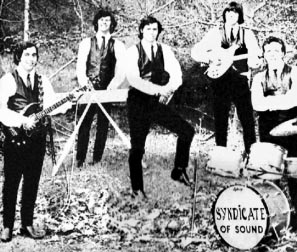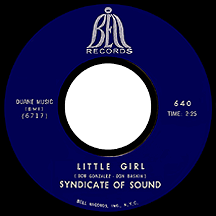SYNDICATE OF SOUND
Little Girl
Winning a Battle of the Bands competition against a hundred opponents is quite a feather in the collective caps of the musicians involved. It's an even bigger accomplishment when The Golliwogs are one of the losing groups! Right? The band called Syndicate of Sound knows this feeling of victory. Hailing from San Jose, they took first place at a San Francisco Bay Area battle in 1965, the prize being a one-shot recording deal with Bob Keane's Del-Fi Records, resulting in "Prepare For Love," perplexingly released on the Scarlet label, then shortly afterwards on Del-Fi. The uptempo British Invasion-influenced track disappeared, but SOS didn't give up. Neither did the Golliwogs, but the also-ran band would have to wait awhile for their shot.
Bob Gonzalez, an alto sax player as far back as elementary school, was in a couple of groups in the vicinity of San Jose during his teens: The Pharoahs (not the group headed by Sam the Sham with a differently spelled name) and Lenny Lee and the Nightmen. He switched to bass along the way and hooked up with guitar player Don Baskin, guitar and keyboard player John Sharkey, guitarist Larry Ray and drummer John Duckworth. The creative songwriters of the bunch were split into two factions: Bob and Don as a team, and John Sharkey writing solo (shades of John and Paul...and George!). The former came up with the next single, the latter the one after that. It was the Gonzalez-Baskin track "Little Girl" that clicked.
Hush Records, a company from Richmond (across the bay to the north of San Francisco), pressed the first copies of the single, featuring Baskin's smirky spoken word vocals (a contrast to all the other actually-sung-songs at the time) admonishing the "Little Girl" in question for her unfaithful ways ('you went out on me, so?...other girls did it too' suggests the problem may have been more his than hers). Airplay in San Jose led to San Francisco's hot top 40 station KYA exposing it in the major market, prompting Bell Records in New York to take notice, sign the group, and get the record out across America. Particularly relatable to the post-pubescent high school crowd ('you got nothin' to hide, everybody knows it's true...too bad little girl, it's all over for you!'), the message would seem to connect more with guys than gals. At any rate "Little Girl" hit the top ten in July 1966, a significant cog in the garage band cycle that was rolling ever faster with each passing day.

Larry Ray was replaced by Jim Sawyers just as the song was hitting, though perhaps only Ray knows the real reason why. The band appeared practically everywhere the rest of the year, gaining TV exposure on Where the Action Is and many other shows. James Brown, who performed on one such show, took a liking to the guys and that led to an opening spot on his concert at San Francisco's Cow Palace in July. Brian Epstein made an offer for them to open for The Beatles on their August '66 tour, but there was an apparent dispute over money and the deal fell through. Undaunted, they opened for some of the hottest mid-'60s acts that summer and fall, including The Young Rascals and Sam the Sham and the Pharaohs, in addition to British bands they'd been inspired by, The Rolling Stones and The Yardbirds, and contemporaries like ? and the Mysterians, another breakout band of '66.
Sharkey penned the follow-up single, "Rumors," with a group vocal that defied listener connection to the earlier hit and the appropriate degree of rough-edginess to earn the respect of any psych-band-fan. It landed mid-chart at the end of summer. The next two Bell singles didn't fare as well and the band began to splinter. Gonzalez checked out in '67 and Duckworth joined up with the Sixth Army Band (presumably to serve in the military without risk of being sent to Vietnam), replaced on drums by Carl Scott. SOS had one single on Capitol in 1969, a remake of "You're Looking Fine" (a Ray Davies song that first appeared on The Kinks' 1966 album Face to Face). Meanwhile, The Golliwogs had gotten over the shame of losing that 1965 Battle of the Bands contest, reinventing themselves as Creedence Clearwater Revival. Good things come to those who keep trying!
Buddah Records, dominating the bubblegum market in the late '60s, released the next Syndicate of Sound 45, "Brown Paper Bag" (written by Steve Jenkins), which bypassed the bubble-blowing formula for a more mainstream rock approach. The record returned them to the national charts in spring 1970, but interest in the band was far off its '66 peak. After one final Buddah single, "Mexico," Baskin and Sharkey went their separate ways, effectively breaking up the Syndicate. In the 1990s all but Sharkey reunited and the group has been giggin' together ever since.


